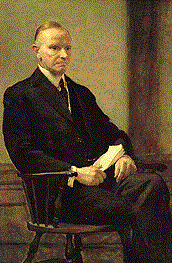Election of 1928
 President Coolidge announced in August
1927 that he did not "choose to run" for reelection. In
February 1928, Hoover became a candidate for the Republican
presidential nomination. The party’s national convention
nominated him on the first ballot, and chose Senator Charles
Curtis of Kansas for Vice President. The Democrats nominated
Governor Alfred E. Smith of New York for President and Senator
Joseph T. Robinson of Arkansas for Vice President.
President Coolidge announced in August
1927 that he did not "choose to run" for reelection. In
February 1928, Hoover became a candidate for the Republican
presidential nomination. The party’s national convention
nominated him on the first ballot, and chose Senator Charles
Curtis of Kansas for Vice President. The Democrats nominated
Governor Alfred E. Smith of New York for President and Senator
Joseph T. Robinson of Arkansas for Vice President.
In the election compaign, Hoover spoke hopefully about
increasing prosperity. He observed, "The slogan of progress
is changing from the full dinner pail to the full garage."
Prohibition became a major issue of the compaign. Smith wanted to
repeal Amendment 18 of the Constitution, which prohibited the
sale of alcoholic drinks. Hoover called Prohibition an
"experiment noble in motive." Millions of Americans
felt that the Republicans would keep the nation prosperous. In
addition, many voters opposed Smith because he was a Roman
Catholic.
A native of Iowa, Hoover depicted himself as a simple farmboy
who, through hard work and pluck, had grown up to be wealthy and
famous. During the campaign he told people tales on an normal
boyhood spent in rural America, participating in activities like
swimming holes, hunting and fishing,. His childhood, however, was
more complicated than that. Orphaned as a boy, Hoover was
shuttled back and forth between a variety of relatives until he
went to Sanford University. He graduated with a degree in mining
in 1893, and after laboring in the mines during the depression
that year, he go an engineering job with an international firm.
Brilliant and talented, he was a millionaire twelve years later.
The very portrait of the self-made man, Hoover represented a
safe, familiar world.
Smith offered a vivid contrast. The son of immigrants, he as
an Irish Catholic from Hell’s Kitchen New York City who had
started public life with nothing and climbed the political ladder
as a normal politician. Both Smith and Hoover represented the
future, not so much in terms of science, technology, and
organization, but in terms of cultural pluralism and
urbanization. The future of America was in the cities, and the
cities were full of new ethnic groups struggling for acceptance
and the good life.
At the end of the election, Hoover carried 40 of the 48 states
and received 444 electoral votes to only 87 for Smith. After the
election, President-elect Hoover made a good-will-tour of Latin
America. His trip helped lay the foundation for the "Good
Neighbor Policy" of the Franklin D. Roosevelt era.
 President Coolidge announced in August
1927 that he did not "choose to run" for reelection. In
February 1928, Hoover became a candidate for the Republican
presidential nomination. The party’s national convention
nominated him on the first ballot, and chose Senator Charles
Curtis of Kansas for Vice President. The Democrats nominated
Governor Alfred E. Smith of New York for President and Senator
Joseph T. Robinson of Arkansas for Vice President.
President Coolidge announced in August
1927 that he did not "choose to run" for reelection. In
February 1928, Hoover became a candidate for the Republican
presidential nomination. The party’s national convention
nominated him on the first ballot, and chose Senator Charles
Curtis of Kansas for Vice President. The Democrats nominated
Governor Alfred E. Smith of New York for President and Senator
Joseph T. Robinson of Arkansas for Vice President.